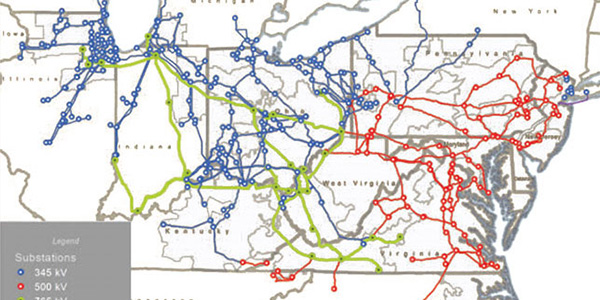PJM’s consumer advocates on Thursday proposed changing the venue for discussions on NERC’s reliability standard on critical transmission facilities, saying the current process is moving too slowly.
Greg Poulos, executive director of the Consumer Advocates of the PJM States (CAPS), told the Markets and Reliability Committee that his organization will seek a vote next month to eliminate the Planning Committee’s special sessions on Critical Infrastructure Stakeholder Oversight (CISO) and move discussions to the MRC under a revised issue charge.
NERC’s Critical Infrastructure Protection standard (CIP-014) requires transmission owners to protect assets whose loss or sabotage could result in widespread instability, uncontrolled separation or cascading outages.
Last August, the PJM Transmission Owners gave notice they were planning to make a Federal Power Act Section 205 filing to develop a solution for addressing existing CIP-014 facilities, almost two years after Poulos said PJM raised the issue at its 2017 Grid 20/20 conference. (See PJM Defends Resilience Focus as Pre-emptive, not Excessive.)
In December 2019, stakeholders approved the issue charge that created the CISO discussions at the PC, which was to focus on avoiding future CIP-014 facilities and mitigating any that arise.
About a month later, the TOs’ made a 205 filing outlining their plan for addressing fewer than 20 existing CIP-014 facilities, a plan approved by FERC in March (ER20-841). (See FERC Approves PJM TOs’ Critical Tx Process.)
Poulos said advocates were proposing the venue change in part because the CISO process was moving too slowly. CISO’s work plan called for completing its work in June and returning to the full PC with a proposal in July, but PJM now expects it to work into September.
“We don’t take this [action] lightly,” Poulos said. “Aspects of this discussion really haven’t moved at all in the last couple months in the Planning Committee.”
Poulos also said the advocates didn’t feel their proposals would get a fair hearing in the PC because committee Chair Dave Souder has expressed opposition to CAPS’ proposals.
“When the chair is saying we’re opposing your position, it’s really hard to feel like we’re going to have a good opportunity to be heard,” he said. “There is some frustration with how the Planning Committee works compared with other committees. There is no other chair that we can think of that has spoken against [a stakeholder] package.”
Souder said development of PJM’s proposals were slowed by the RTO’s consultation with ReliabilityFirst and SERC Reliability on how to provide stakeholders information on CIP-014 mitigation projects under the strict confidentiality rules in the CIP standards. “The outreach took time but was required to provide CISO the needed clarity,” he said.
PJM introduced “avoidance” proposals in June and July and expects to introduce a “mitigation approach” at the August CISO meeting, Souder said. “Revoking and reassigning the issue charge is not necessary and will only delay this process,” he said.
No other stakeholders have sponsored a package on mitigation, although CAPS introduced mitigation “components” in April, he said. According to Souder, CAPS refused to incorporate the RTO’s feedback in its proposal, which he said would violate the CIP standards.
CISO can complete its assignment in September with a PC vote in November and MRC vote before the end of the year, Souder said.
Poulos said CAPS is concerned that unless the issue is moved to the MRC, stakeholders might miss the opportunity for input if the TOs choose to make another 205 filing. The TOs must give stakeholders 30 days’ notice of plans for a filing, and FERC must rule on it within 60 days of filing.
“That 90-day period causes us concern,” he said.
Robert Taylor of Exelon said PJM sought input from SERC, RF and NERC at CAPS’ request. “To ask PJM to do that outreach and then assert that that outreach is slowing down progress is problematic,” he said.
David “Scarp” Scarpignato of Calpine defended PJM’s handling of the CISO proceedings, saying it was a “very informative, very well-run stakeholder process.”
Alex Stern, director of RTO strategy for PSEG Services, accused CAPS of seeking a “do-over.”
“It’s extremely dangerous to hear someone suggest that because they disagree with a PJM chair of a standing committee, the chair is somehow incapable of allowing voices to be properly heard,” he said. “I don’t think that’s happened in this proceeding.”
Jim Davis of Dominion Energy said the original issue charge had the correct balance between transparency and CIP confidentiality requirements. “If we were to provide all the details on mitigation projects, this proposal would result in transmission providers … giving the public a roadmap to the grid’s vulnerabilities,” he said.
Susan Bruce, representing the PJM Industrial Customer Coalition, said there is “frustration and concern from those who are paying the bills.”
“How can we fix this so customers and state regulators can have additional confidence?” she asked.







